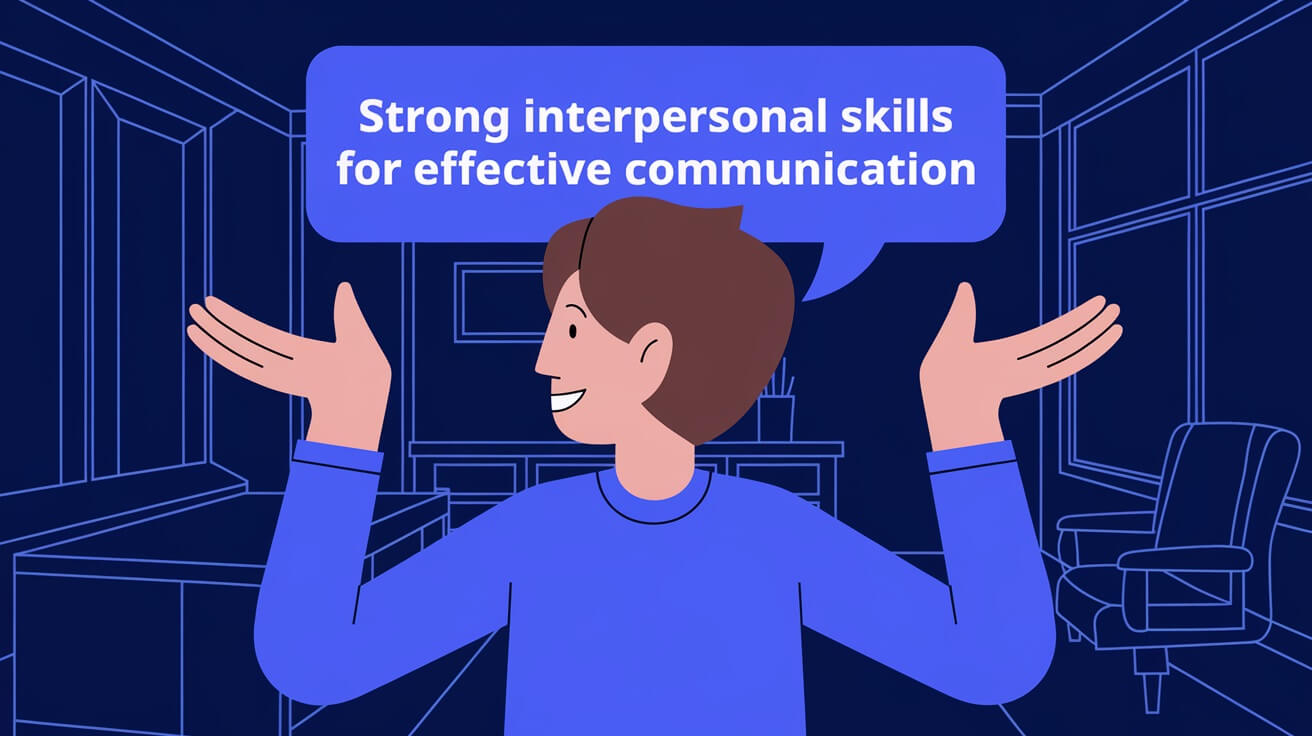
A Practical Guide to Develop Strong Communication Skills
Strong communication skills are among the most valuable abilities you can cultivate. Strong Communication can make all the difference, whether you're sharing ideas in a professional meeting, interacting with colleagues, or strengthening personal relationships.
This guide will explore actionable steps to improve your communication skills, backed by research, real-life examples, and expert advice. By the end, you'll have a practical understanding of enhancing your interpersonal skills and the confidence to communicate clearly.
1. Introduction
Effective Communication goes beyond merely exchanging words; it's about connecting, understanding, and being understood. Many people struggle to express themselves or feel anxious in social settings. These common barriers can often hold us back from achieving our full potential. Luckily, communication skills can be learned and practiced.
In this guide, we'll review the essential components of Communication, offer practical steps for improvement, and share tips to help you handle common barriers.
Whether you aim to be a better listener, a more confident speaker, or have smoother interactions, these insights will equip you with the tools to become a better communicator.

What Are Communication Skills?
Communication skills encompass a variety of methods we use to convey thoughts, ideas, and feelings to others. This includes verbal, non-verbal, and listening skills, which affect how effectively we communicate. Let's break down each element:
-
Verbal Communication involves the choice of words and tone used to share information.
-
Non-Verbal Communication: This includes body language, facial expressions, and gestures, often conveying more than words.
-
Active Listening involves listening attentively to fully understand the speaker's message, responding thoughtfully, and asking relevant questions.
Each component contributes to effective communication and strengthens our ability to build relationships, resolve conflicts, and express ourselves clearly.
Core Components of Strong Communication

To improve your Communication, focus on developing these core skills:
Active Listening
Active Listening means focusing entirely on the speaker, showing genuine interest, and engaging in the conversation without interrupting. It's a key skill that helps in building trust and mutual understanding.
Tips:
Maintain eye contact, nod occasionally, and avoid interrupting. To show you're engaged, use phrases like "I see" or "That makes sense."
Verbal Communication
Effective verbal Communication relies on clarity, simplicity, and empathy. It's about choosing words that match your intention and speaking in a way that others can easily understand.
Tips:
Use straightforward, easy-to-understand language and skip the technical terms. Adjust your message so it resonates well with your audience's knowledge level.
Non-Verbal Communication
Non-verbal signals frequently convey more than spoken words. Your body language, gestures, and even facial expressions convey emotions and intent, influencing how your message is received.
Tips:
Keep an open posture, make consistent eye contact, and pay attention to your gestures. Non-verbal cues can show openness and empathy.
Emotional Intelligence (EQ)
Emotional intelligence (EQ) includes recognizing and managing one's emotions and understanding others' emotions. High EQ enhances social interactions and helps one navigate various communication settings.
Tips:
Practice empathy by considering others' perspectives and work on self-regulation through mindfulness exercises.
Steps to Develop Effective Communication Skills

Improving Active Listening
Active Listening requires patience, attention, and focus on the speaker rather than simply waiting for your turn to talk. The goal is to fully understand the message before responding.
Exercise:
Try summarizing the speaker's points before responding. This will demonstrate that you were paying attention and ensure clarity.
Practicing Clear Verbal Communication
Clear Communication involves getting your point across without unnecessary words or filler language. Aim for simplicity and accuracy in every conversation.
-
Exercise: Record yourself speaking about a topic for a minute, then listen to identify areas to improve clarity or remove unnecessary language.
Enhancing Non-Verbal Cues
Awareness of non-verbal signals—like posture and eye contact—can significantly impact how others perceive you.
Exercise:
Practice in front of a mirror to see how your natural gestures and facial expressions come across. Make adjustments to appear more open and engaged.
Building Emotional Intelligence (EQ)
Emotional intelligence (EQ) is key to understanding and responding to others in a way that fosters positive connections. Higher EQ can improve your ability to navigate social situations.
Exercise:
Reflect on how you react to different scenarios. Consider why you reacted a certain way and how you might respond more thoughtfully next time.
Real-Life Applications of Communication Skills

In the Workplace
Effective Communication (EC) is vital for collaboration, problem-solving, and leadership in professional settings.
Example:
Picture a team meeting where one person dominates the discussion. By applying active Listening and clear Communication, you can create a space where everyone's voice is heard, fostering a more productive environment.
Building Personal Relationships
Clear Communication strengthens trust and respect in relationships, allowing individuals to express themselves openly and better understand each other.
Example:
When discussing boundaries or expectations, empathetic listening and open body language create an atmosphere of trust and respect.
Navigating Difficult Conversations
Handling tough conversations—like giving feedback or discussing conflicts—requires sensitivity and focus on maintaining a constructive tone.
Example:
Use a calm tone, avoid blaming language, and focus on addressing the issue rather than the person. This can make the conversation more productive and less aggressive.
Overcoming Common Barriers to Communication

Internal Barriers
Internal barriers include self-doubt, anxiety about public speaking, and low confidence, which can prevent you from expressing yourself effectively.
Solution:
Start small by practicing with friends or family. Over time, gain confidence through consistent practice and gradually tackle more challenging situations.
External Barriers
External barriers, such as noise, distractions, or cultural differences, can impact Communication.
-
Solution: Minimize distractions where possible, and if cultural differences arise, take the time to learn about the other person's communication style.
Strategies for Consistent Improvement
-
Seek constructive feedback on your communication style.
-
Reflect on conversations to evaluate what went well and where you could improve.
-
Set specific goals for each interaction, such as practicing active Listening or focusing on non-verbal cues.
Advanced Tips for Mastering Communication

Developing Assertiveness
Assertiveness involves confidently expressing one's needs while respecting others. This balance is essential for healthy Communication in any relationship.
Exercise:
Start by practicing saying "no" to small requests if you genuinely can't accommodate them. This builds confidence in expressing your needs.
Effective Questioning Techniques
Questions drive conversations forward and show that you're engaged. Open-ended questions encourage more detailed responses, fostering a deeper dialogue.
Exercise:
Use open-ended questions like "How did that make you feel?" to encourage the other person to share more.
Enhancing Storytelling Abilities
Storytelling is a powerful tool for engagement. It can make your message more relatable and memorable, especially in professional presentations or when explaining complex ideas.
Exercise:
Choose a personal experience and practice telling it with precise, vivid details. Focus on keeping the story concise and relevant to your point.
List of strong communication skills for all
Here’s a concise list of 25 tips to help develop strong communication skills:
-
Listen actively – Focus fully on the speaker.
-
Maintain eye contact – Shows interest and confidence.
-
Use clear language – Keep your words simple and direct.
-
Practice empathy – Understand others' perspectives.
-
Be mindful of body language – Non-verbal cues matter.
-
Ask open-ended questions – Encourage dialogue.
-
Stay concise – Avoid rambling.
-
Practice patience – Don’t interrupt.
-
Tailor your message – Adapt to your audience.
-
Avoid filler words – Be direct and confident.
-
Use positive language – Creates a friendly tone.
-
Be aware of tone – Match your tone to the message.
-
Give constructive feedback – Be helpful, not critical.
-
Use storytelling – Make points memorable.
-
Watch for cues – Notice others' reactions.
-
Stay open-minded – Respect different opinions.
-
Practice in front of a mirror – Observe your gestures.
-
Take deep breaths – Helps manage nervousness.
-
Use hand gestures naturally – Emphasize key points.
-
Clarify when needed – Ensure understanding.
-
Stay authentic – Be yourself.
-
Practice active listening – Respond thoughtfully.
-
Reflect on conversations – Note areas for improvement.
-
Smile genuinely – Creates warmth and openness.
-
Learn from feedback – Embrace constructive criticism.
Conclusion
Improving your communication skills is lifelong; even small changes can significantly affect you. Active Listening, clear verbal expression, and nonverbal awareness are the foundation of strong Communication. Using the strategies in this effective guide, you can build confidence as a communicator, whether in professional settings, social situations, or personal relationships.
You'll notice a difference in connecting with others with practice and patience. Communication is a skill that continues to grow with each interaction. So, start practicing today, and watch your ability to connect, understand, and express yourself flourish.
Life Skills Communication Skills

